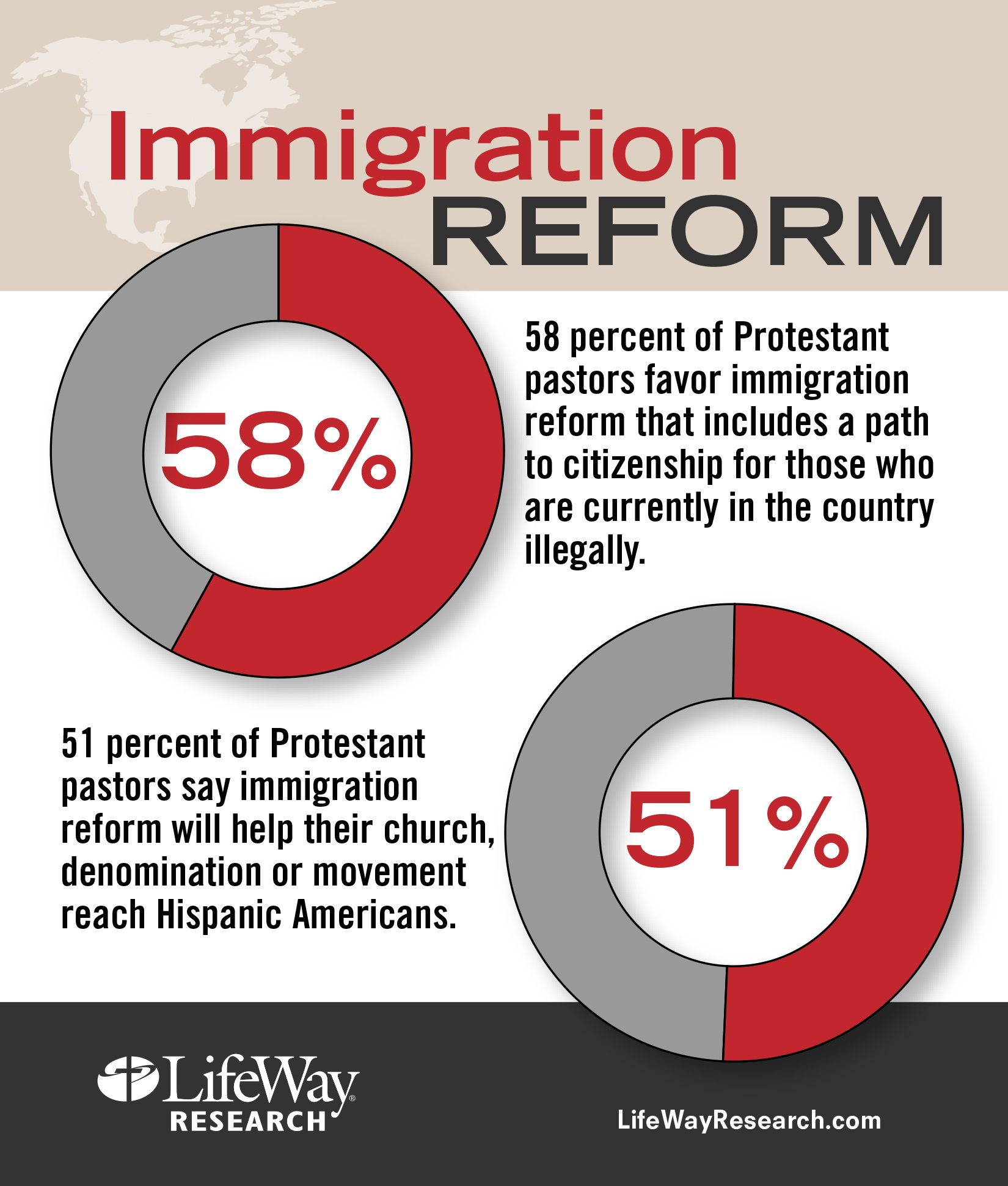
NASHVILLE (BP) — Nearly six in 10 senior pastors of Protestant churches support immigration reform that includes a path to citizenship, according to a new survey from LifeWay Research.
Many of the pastors hope reform will help them minister to more Hispanic Americans. But few say the current immigration system hurts current members of their churches.
The poll of 1,007 senior pastors of Protestant churches, conducted Sept. 4-19, comes as immigration reform has stalled on Capitol Hill. The Senate passed a bill this past summer that includes a path to citizenship, but a House version of the bill seems dead, with House John Boehner telling reporters on Wednesday (Nov. 13), “We have no intention of ever going to conference on the Senate bill.”
According to the LifeWay Research survey, 58 percent of Protestant pastors agree with the statement: “I am in favor of immigration reform that includes a path to citizenship for those who are currently in the country illegally.”
Just over half (51 percent) agree that, “Immigration reform will help our church, denomination or movement reach Hispanic Americans.” Among pastors in favor of immigration reform with a path to citizenship, 67 percent agree it will help their church, denomination, or movement reach Hispanic Americans.
A number of denominations, including the Southern Baptist Convention and the United Methodist Church, have passed resolutions in favor of immigration reform in recent years. A 2011 SBC resolution on immigration can be accessed here.
Several national faith leaders, including representatives from the National Association of Evangelicals, Southern Baptist Convention, and the National Latino Evangelical Coalition, met with President Obama Nov. 13 to discuss immigration reform. About one in five Hispanic Americans (22 percent) identify themselves as Protestants, according to the Pew Hispanic survey.
Alejandro Mandes, national director of Immigrant Hope, a Minneapolis-based nonprofit that trains churches on how to assist immigrants, has been working on immigration reform for a decade. Protestant pastors and groups like the National Association of Evangelicals once were reluctant to get involved in immigration issues. That’s changed, he said, as American culture and congregations have become more diverse.
“A lot of congregations have realized that they are now on a mission field,” Mandes said, noting that churches will continue to assist immigrants, even if Congress puts reform on hold. “For me, it is not about politics. It is about the Great Commission and the Great Commandment,” he said.
Only 15 percent of pastors say members of their congregations are hurt by the immigration system. Meanwhile, pastors in the Northeast (57 percent) and Midwest (49 percent) say their church isn’t negatively impacted by the current immigration system, compared to the South (42 percent) and West (33 percent). About a quarter (27 percent) say immigration reform would help church members.
“Many Protestant churches are predominantly composed of one ethnic group,” said Scott McConnell, vice president of LifeWay Research. “Therefore, many pastors do not have immigrant members, much less members who are personally affected by the current immigration system.”
Mainline pastors are more likely to support reform (82 percent) and to say reform would help church members (42 percent). By contrast, 54 percent of evangelical pastors support reform, while 21 percent say it would help church members.
Researchers found pastors support reform even if it does not affect their congregation, McConnell said.
Pastors who disagree when asked if the immigration system has “negatively impacted” church members are quite open to reform. Of that group, nearly six in 10 (58 percent) say they still support reform.
Methodology: This phone survey, conducted Sept. 4-19, used a stratified random sample of Protestant churches by church size and denominational groups. Up to six calls were made to reach a sampled phone number. Each interview was conducted with the senior pastor, minister or priest of the church. Responses were weighted to reflect the geographic distribution and denominational groups of Protestant churches. The completed sample is 1,007 phone interviews and provides 95 percent confidence the sampling error does not exceed plus or minus 3.1 percent. Margins of error are higher in sub-groups.
–30–
Bob Smietana is a writer for LifeWay Christian Resources. Get Baptist Press headlines and breaking news on Twitter (@BaptistPress), Facebook (Facebook.com/BaptistPress) and in your email (baptistpress.com/SubscribeBP.asp).
















